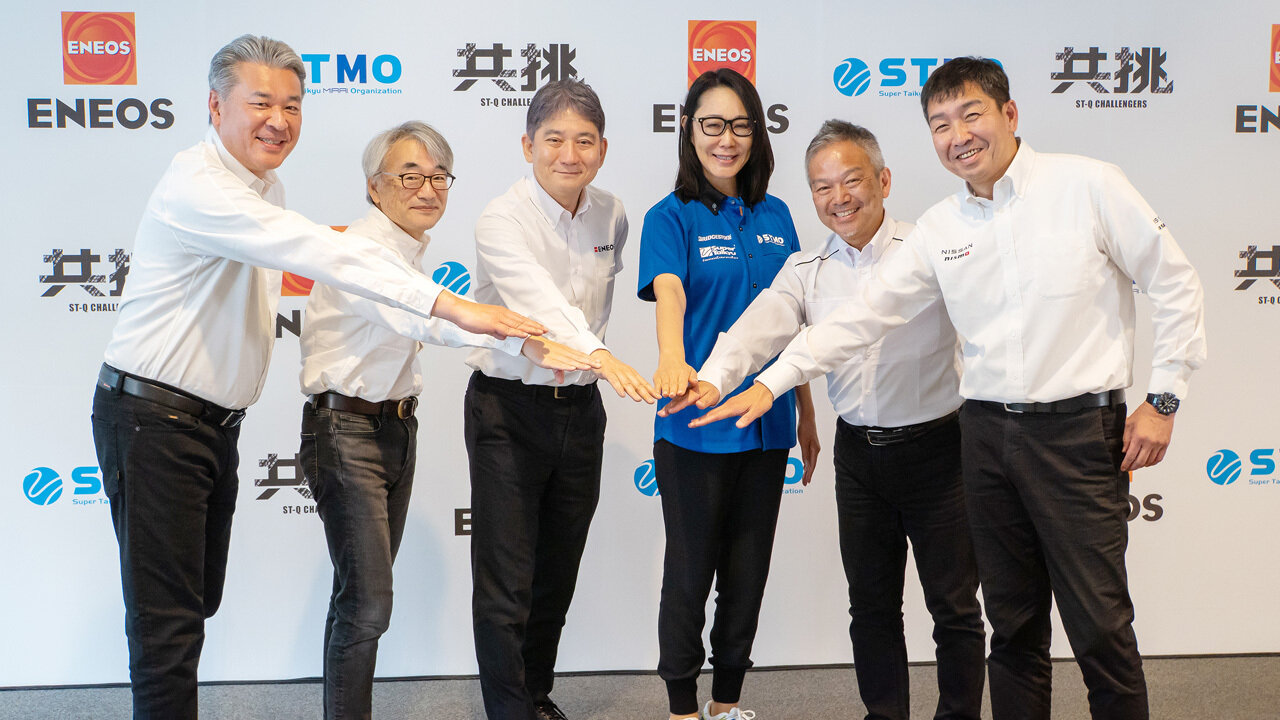
At the Super Taikyu Fuji 24 Hours, an all-Japan force of fuel and car manufacturers announced the development of a low-carbon gasoline. During the press conference, the companies emphasized the importance of a multi-pathway approach that includes liquid fuels.
Challenges to overcome
During the Q&A session, ENEOS CTO Fujiyama fielded a question about the key to navigating the transition period. He stressed the importance of gaining broader acceptance for carbon-neutral fuels.
CTO Fujiyama (ENEOS)
First and foremost, I think we need the world to endorse these carbon-neutral fuels.
In the case of Brazil, ethanol is cheaper due to subsidies and other measures, but will the public be receptive to the addition of ethanol, which is ordinarily more expensive?
Are people willing to pay more if it means helping Japan prevent global warming?
I don’t think this is a matter of simply providing subsidies. After all, subsidies are funded by taxes, so I believe the key factor is whether people are willing to contribute to preventing global warming, even if it means paying more out of pocket.
Vice President Nakajima (Toyota)
How will society bear the cost of decarbonizing? Right now, gasoline itself is also subject to various taxes, but how do we ensure fairness in this area while working toward carbon neutrality?
Another point is that, while of course there are many other ways of decarbonizing besides this fuel, people inevitably focus only on the visible costs.
With BEVs, for example, this includes investment in infrastructure, such as the need to provide charging facilities, and I think the same is true for hydrogen. Each new fuel comes with many challenges that must be overcome.
I believe initiatives such as this one, which serve as a rallying cry for like-minded industry peers to collaborate and explore solutions, are extremely important.
In any case, the initial costs are an inescapable fact. Naturally, all of us in the automotive and fuel industries recognize this reality as we take on the challenge.
I think any approach must look to share the costs equitably, while also addressing the question of how to structure taxation.
The role of endurance racing
Separately, the five companies were asked about the rationale behind debuting the fuel at the grueling Fuji 24 Hours Race. Here are their responses:
CTO Fujiyama (ENEOS)
For us as a fuel company, the race is a high-profile event that attracts a very festive crowd.
We see great benefits in being able to use such a platform to raise awareness of our carbon-neutral fuels.
Senior Vice President Kiga (NISMO)
More than anything, races are run at full load and full throttle, the equivalent of driving tens of thousands of kilometers under regular conditions.
Being able to observe that in a single short period provides incredibly valuable data. I think that is the purpose of using the fuel in races.
CTO Umeshita (Mazda)
Endurance races are extremely demanding environments, far tougher than anything out in the general market. As testing grounds, they help us to clearly understand and overcome technical challenges, marking a solid step forward toward a market launch.
CTO Fujinuki (Subaru)
Although our tests are conducted with set criteria, we cannot say for certain that they cover every usage scenario out in the real world.
When you put a car through an endurance race, you encounter issues you never would have imagined. This experience is tremendously valuable.
Another aspect of racing is the competition. Here at the press conference, everyone is playing it cool, but whether you win or lose, go home happy or disappointed, is not something we can dictate.
In addition, all the information that is shared makes races a fantastic opportunity for honing our vehicles.
Vice President Nakajima (Toyota)
The most important thing is that so many people have come to this Super Taikyu event and taken an interest.
I’m sure that organizing such an event is difficult to coordinate. Yet for us, having this Super Taikyu platform provides a goal to work towards, where we can come together to explain our shared vision.
As a result, I am confident that we are helping the public to gain a deeper understanding of carbon neutrality, and to engage with the issue as a challenge for society.
The cars being developed in Super Taikyu’s ST-Q class can now make use of a new low-carbon gasoline, as the all-Japan co-challenge continues to strive toward a carbon-neutral society.

